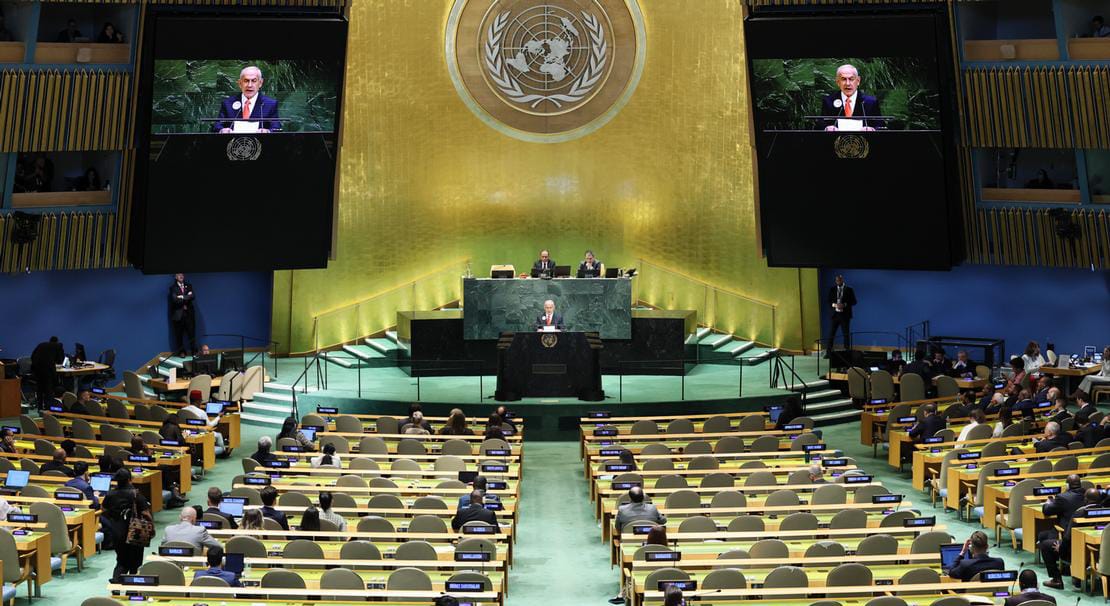Netanyahu’s UN Speech and the Fight Against Hamas
Israeli Prime Minister Benjamin Netanyahu addressed the United Nations with a bold claim that Israel has dismantled much of Hamas’s military infrastructure. He described the campaign in Gaza as one of the most decisive battles in Israel’s recent history. Netanyahu stressed that the military achievements against Hamas represent a turning point in the long conflict. Moreover, he emphasized that his government will not stop operations until the return of hostages, taken by Hamas nearly two years ago, is secured. The speech highlighted a narrative of determination and national resilience. It underscored that Israel views the continuation of military pressure as essential to preventing Hamas from regaining strength. According to Israel’s Ministry of Foreign Affairs, the government considers Hamas not only a threat to Israeli security. They also see it as a destabilizing force for the entire region.
Regional Implications and Security Challenges
Netanyahu’s remarks extended beyond Hamas. They included references to Iran’s nuclear ambitions and Hezbollah’s activities in Lebanon. The Israeli leader framed these threats as interconnected elements of a larger regional struggle. The targeted killing of Hezbollah leader Hassan Nasrallah, which Netanyahu presented as a major victory, was portrayed as part of a broader strategy. This aims to weaken the “axis of resistance.” Analysts note that such statements are aimed at reinforcing Israel’s stance as a regional power. They highlight the capability to counter multiple adversaries simultaneously. These developments carry implications for regional stability. Heightened tensions affect neighboring states and draw in global powers. Security concerns are amplified by the perception that Iran continues to pursue nuclear capabilities. This occurs despite international pressure, and it is a topic closely monitored by the International Atomic Energy Agency. Netanyahu linked these regional challenges directly to Israel’s future security, calling for stronger alliances and unwavering support from Western nations.
Rejection of a Palestinian State and Political Ramifications
One of the most striking elements of Netanyahu’s speech was his outright rejection of the creation of a Palestinian state. He argued that such a development would pose an existential threat, describing it as a form of “national suicide” for Israel. This statement comes at a time when several Western countries, including the UK, Canada, and Australia, have moved to recognize Palestine as a state. This movement intensifies diplomatic friction. Netanyahu’s labeling of the Palestinian Authority as “corrupt to the core” further underlined his government’s resistance. They resist diplomatic pathways that involve Palestinian sovereignty. His position stands in contrast with international efforts led by the United Nations to seek a two-state solution as the foundation for long-term peace. For Netanyahu, the continuation of military campaigns and territorial control remains the preferred route. This is to ensure security and survival. The debate over Palestinian recognition highlights the deep divisions within international diplomacy. Here, Israel’s stance collides with global advocacy for Palestinian rights and sovereignty. This rejection also resonates domestically. Netanyahu consolidates support among constituencies who view compromise as weakening national security.
Israel’s insistence on maintaining military pressure and rejecting Palestinian statehood underscores the complex intersection of security, diplomacy, and ideology. While Netanyahu portrays his government’s actions as victories ensuring survival, critics argue that the long-term consequences could isolate Israel internationally. It could also deepen divisions in the Middle East. As global leaders continue to debate, the future of the conflict remains uncertain. The situation is shaped by competing visions of security, sovereignty, and peace. For broader regional analysis and background on Middle East geopolitics, resources such as the Council on Foreign Relations provide valuable insights into the unfolding dynamics.







